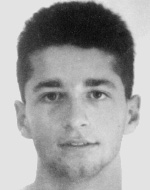Ben-Ze’ev, Nir
Ben is gentle and Dan. He was born on Purim, on the 13th of Adar 5734 (March 7, 1974) in Haifa, the brother of Tamar and Uri. A happy and happy childhood passed through Nir in the Danish neighborhood on Mount Carmel. Three years of elementary school were spent on paper in Boston, where his family lived. These were years filled with trips, entertainment and many experiences. When the family returned to Israel, Nir studied at the “Einstein” elementary school and later attended junior high school and high school “Alliance”. Nir was a fair-haired, blue-eyed boy, and a welcoming smile accompanied him wherever he went. He was characterized by unorthodox kindness and modesty, and fought for principles of justice and brotherhood between people. He had the ability to listen and was always willing to help. He was surrounded by people and everyone loved him. Nir joined the “Scouts” movement as a trainee and continued as a guide, as coordinator of the Shluchim and as head of the Latem tribe in Haifa. Social activity was very important to him and he saw his future as an educator. In the period between the end of the 12th grade and his enlistment in the army, he was very concerned about how he could best contribute to the army, on the one hand, he had ambitions to excel and become an officer, but on the other hand Nir was a very sensitive child, Nir was drafted into the IDF in November 1992 and joined the Engineering Corps. Throughout his short service he was not at all satisfied with this decision. During basic training, the gap between Nir’s expectations of himself as a soldier and what he felt he was capable of doing was exacerbated. He gave up sleepless nights to keep or help other recruits in learning, and at the same time his mental and physical condition was deteriorating. Nir felt that he could not keep up with the load, but at the same time sharpened his demands of himself. Following a mental breakdown, Nir was admitted to the mental health hospital in Tirat Hacarmel. This hospitalization was unbearable and humiliating for Nir, and his stay with other patients undermined his self-image and made him doubt his ability to ever return to the army or function in a “normal” life. On the night of Yom HaAtzma’ut, Nir decided to take his own life, killing himself at his home late at night when he was 19, and Nir was buried in the military cemetery in Haifa, near the sea he loved. He was followed by his parents, a twenty-two-year-old brother, a twenty-year-old sister, a family and hundreds of friends who were stunned, and his colleagues and colleagues said that Nir was “fully integrated and stood out as a good soldier, an investor with a very high level of motivation and personal, mental and physical abilities. He was kind, worked harder than others, and was admired and accepted by the department, quiet and humble, and praised his contribution to the department, claiming others contributed more than he did. ” The unit commander wrote: “Nir was evaluated excellent soldier by his superiors, and he was expecting a lot more. Nir was a friend of many and always made sure to create a positive atmosphere around him. It is important to know that today, in a world of individualists, it is difficult to find people like him. His memory floats and tears in the eyes of his fellow fighters. “
